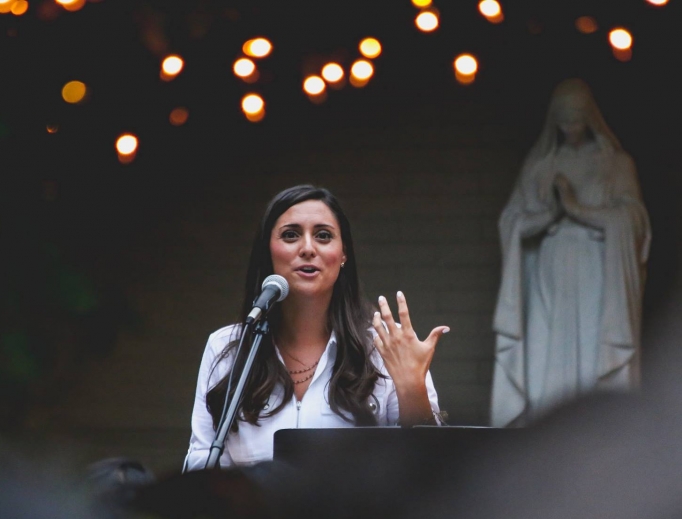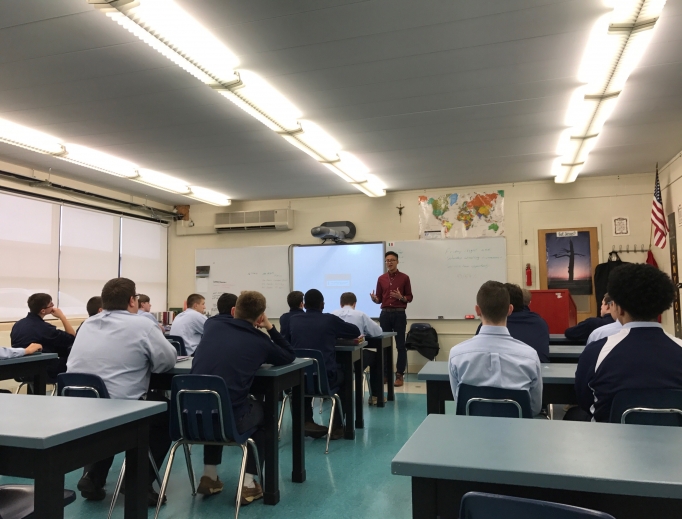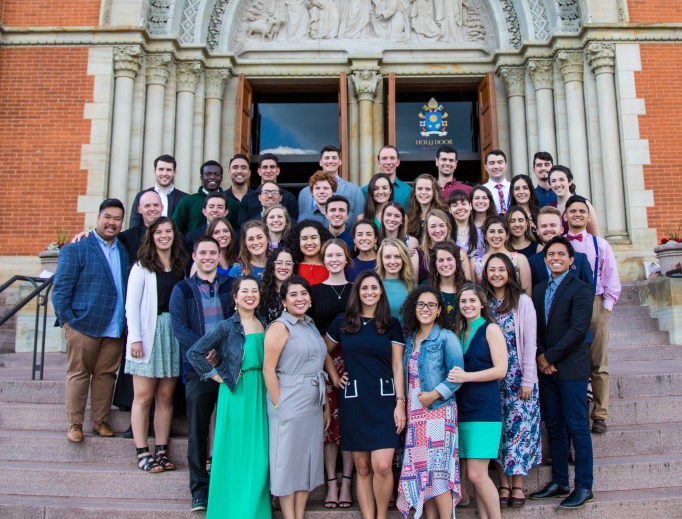Chastity Crusaders: The Culture Project Presents Positive Message
Missionaries offer uplifting presentations, with striking results.

After hearing a talk by The Culture Project at his high school, a senior approached the speaker to say he realized his behavior to women had not been respectful.
Even worse, he confessed that he had been collecting nude images of girls in his class and sharing them with his buddies, who had amassed a library of the pictures.
As shocking as this story might be to some, The Culture Project founder Cristina Barba knows it is not unusual for a teen girl to get a text message, or “sext,” from a teen boy asking for such a picture. And she tells the story because it demonstrates the power of her ministry’s outreach to a depraved culture. After hearing a presentation counter to that culture and focused on the beauty of the Church’s teaching on human sexuality, the young men involved took responsibility for what they had done and asked what they could do. Through the school administration, they made a retreat, got rid of the photos and apologized to each of the young women individually, Barba said. “And the women forgave them. ... It was a huge reconciliation moment.”

Day after day in dioceses around the country, The Culture Project missionaries are talking to young people and their parents, sharing with them St. John Paul II’s simple message: “You are not who ‘they’ say you are.” Although the results are not always immediate or dramatic, Barba is convinced the project she started in 2014 is making a difference.
Peter Santiago, who served as team leader in the Diocese of Toledo, Ohio, this year, said one of the first talks he gave was to a group of young men in the Archdiocese of San Francisco. “I thought I was losing them. They were talking over me and not paying attention, but I was giving them everything I’ve got, talking about the virtue of chastity and how to live that out as a man.” When he finished, he handed out commitment cards that can be signed as a chastity pledge. Several days later, Santiago got an email from a mother telling him how proud she was of her son for the decision he had made after hearing the presentation: “He came home and said, ‘The missionaries of The Culture Project didn’t talk about intimacy as a thing, but as an important part of us.’” The young man signed the pledge card and put it in a box to keep for his future wife.

Glory Stories
The Culture Project missionaries call those reports “glory stories,” Santiago said. “All of us have those stories because, every once in a while, we get to see a glimpse of how what we do is changing lives.”
Phil Tran, a former missionary who is now a student at St. Vincent College in Latrobe, Pennsylvania, told a similar glory story about how he had left a presentation of his sexual integrity talk thinking he had done an awful job. A few months later, he learned that the father of one of the students in the group had asked his son about the talk. “Dad, it changed my life,” the youth responded. “I don’t know which student it was,” Tran said, “but I did get an email from a student in that group asking for advice on a few things. It seemed like, after his encounter, he wanted to reshape his life.”

Still, Barba said it can be easy to get discouraged because The Culture Project team members know they are fighting an uphill battle. “Every single day, every time you turn on the TV, walk through the supermarket, listen to the radio or scroll through the internet, the ways of the world are strong. And it’s everywhere. It’s all-encompassing.”
But Barba said she knows the apostolate is doing something right when she looks at the stats and sees that more than 50 missionaries have managed to reach more than 150,000 young people in just five years and that many of those missionaries have gone on to form beautiful marriages and families or have responded to the call of a religious vocation. Likewise, she is encouraged when she hears that the students at a high school visited by The Culture Project want the missionaries to come back or when she hears from a teen girl who says that, for the first time, she feels she can say No to a “sext” request. “Lives are being changed concretely.”
How It Started
Barba got the idea for The Culture Project through her work in evangelization and speaking about pro-life issues and chastity. While traveling in Europe, she noticed most of the people she was encountering had pulled away from the Church because of misunderstandings about Catholic teaching on marriage, family, life and sex. Barba said God seemed to be saying to her, “That is my Gospel; that is my message. These practical matters of life, sexuality, marriage and love are the crux of it.”
Upon returning home to Philadelphia, she began to envision a program in which missionaries would go out to speak on these topics while living in community. With the help of nearly 30 people who wanted to join her, she outlined a plan that became The Culture Project, a name chosen with the idea that the missionaries would be taking a universal message to a secularized culture. In giving talks on sexual integrity, friendship and relationships, Barba said the missionaries, recent college graduates in their 20s, present themselves as a group of friends who believe in and have been touched by the truth the Church has to offer. “Basically, we’re living our faith and inviting others to do it in a joyful, healthy manner. It’s not complicated.”
Since starting in the Archdiocese of Philadelphia, The Culture Project has sent traveling and full-time teams to more than 52 dioceses. Besides Philadelphia, the project this year has had full-time teams in the Archdioceses of Los Angeles and San Francisco and the Diocese of Toledo. Another full-time team will be added in Ohio’s Cleveland Diocese in the fall. Additionally, the project has a waiting list of dioceses that want teams to come.
Cleveland Bishop Nelson Perez said he invited The Culture Project to his diocese after becoming aware of its work through conversations with several other bishops. “I was very impressed with their innovative model that involves engaging their missionaries to set out to restore the culture through the experience of virtue.” He sees their work as fitting into the diocese’s effort to provide solid formation and education for young people on the importance of self-respect and living chaste lives.
Ed Hopfner helped bring The Culture Project to the Archdiocese of San Francisco, where he is director of marriage and family life, after hearing one of their presentations at a meeting of diocesan leaders. As a former high-school teacher, he said he appreciates the missionaries’ focus on chastity and virtue because these are big flashpoints in a culture that is inundating young people with messages counter to what the Church teaches. “What I’ve been most impressed with is just how down-to-earth, normal and positive they were about the message. It’s presented in a very disarming way.”
Forming Missionary Teams
Missionaries are chosen for The Culture Project after a highly selective screening process and undergo an intensive two-month formation before going out to speak. In the midst of formation, missionaries take a break to return to their home dioceses for fundraising, rest, assigned reading and Skype sessions with small groups. After that, they reconvene to hear talks by counselors, psychologists, physicians, professional speakers and experts in such fields as sexuality, transgender issues, same-sex attraction and abortion apologetics and to practice the presentations they will give.
The teams, made up of both men and women, live in small communities, usually in former convents or rectories that have space for separate quarters for males and females. “It’s important for our work and formation to be able to emphasize the complementarity between the sexes,” Santiago said, adding that the witness of their shared life can be extremely powerful because it shows they can exist in friendship together, serve as missionaries and live in a school of love and mercy.
A missionary’s typical day starts with Mass and a Holy Hour and continues with talks and other activities, communal prayer and shared meals, depending on each team member’s schedule. Barba said she thinks the daily Holy Hour is key to keeping the missionaries encouraged and motivated, as is the support they receive from one another.
Asked who has been most receptive to The Culture Project’s message, Barba said, “People want to think it’s going to be one group or another. I find all the young people want more. I love the St. John Paul II quote ‘Young people are always searching for the beauty in love. They want their love to be beautiful.’ I find it to be true. You can be in the most secularized audience, where young men and women have given into all these things and have tasted the ways of the world and yet know that something is missing and they’re empty and lonely; people who have tried the world are incredibly open. But the more sheltered ones find themselves encouraged when they meet young people older than they who are cool and saying the same things they were taught. So there’s kind of an equal need because those who are more innocent need their innocence preserved and need encouragement.”

Students’ Stories
A high-school student from Toledo said she had tears in her eyes the entire time she was listening to a Culture Project presentation because she knew that every word was true. “It’s just so hard to fight through the lies of the culture. But I want this: I want to live out chastity,” she said.
An eighth-grade girl from Toledo said she had been through the same cycle with five different guys who flirted with her, told her how beautiful she was, said they loved her and then texted her “pics” because they wanted to see nude pictures of her. After hearing a Culture Project presentation she said she wasn’t going to send the pictures. “Now I can see that those guys don’t actually love me. They just want to use me for my body.”
She also said that after the talk she told her boyfriend if he wanted to date her, he would need to respect her standards and boundaries. She said, too, that she used to make fun of a friend who always talked about saving sex for marriage. “But now, I feel like I get her, and I have a lot more respect.”
Register correspondent Judy Roberts writes from Graytown, Ohio.
















